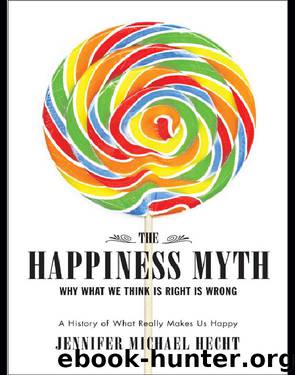The Happiness Myth by Jennifer Hecht

Author:Jennifer Hecht [Jennifer Michael Hecht]
Language: eng
Format: epub
ISBN: 9780061744891
Publisher: HarperCollins
Published: 2007-03-25T16:00:00+00:00
13
Eating
In the medieval West, on feast days, people gorged themselves in animalistic sensualism. In periods of fast they rejected food, sex, and physical effort as antithetical to holiness. Some monks and mystics renounced the pleasures of the body year-round, but for most folk, the common culture held that pleasures were good. The great Christian movements against the flesh date not from the Catholic medieval period, but from the period just after the Protestant Reformation. That is when we find sects of Christianity so hostile to the body that they refused meat and sexual intercourse. Some of them made no exception for procreative intercourse: they were trying to avoid producing more bodies, and they happily died out.
The origins of American vegetarianism can be found in William Cowherd’s New Church in Manchester, England, and his issue was primarily antisex. The Reverend William Metcalfe brought New Church vegetarianism to the United States when he immigrated to Philadelphia in 1817. Metcalfe practiced homeopathic medicine and helped start the American health reform movement. As we saw, George Washington died in 1799, and that marked the beginning of a real rejection of established medicine and its bleedings and purges. Opiates were one alternative; letting nature take its course was another. Metcalfe and other reformers can be said to have exploited the vacuum in medical authority, claiming that they could make you healthy and happy through purity. They rejected opiates and advised helping nature take its course through prohibitions: no meat, no smoke, no liquor. It was Metcalfe who converted Sylvester Graham, and over the next decades, Graham forever marked the American concept of healthy living. You can’t get very far in a movement that says only to reject things. Graham was first and foremost antisex, but he came up with something to say yes to, something he said would do us positive good.
Sylvester Graham championed homegrown, whole-grain, home-baked bread. If you couldn’t grow your own grain, find grain farmed nearby, as local as possible; and for the magic to really work, the dough should be kneaded by the palms, fingers, and fists of the woman who gave birth to you. Again, what gives pause is not that one man would come up with such a thesis, but rather that America accepted it as a viable approach to happiness: Mom’s tough-grain bread instead of sex. Graham’s doctrine was powerful in part because it came at a time when there was widespread distrust of medicine and in part because it seemed to fit with the lifestyle of the times. Early American immigrants came from places where breakfast was greasy and meaty. A lot of them were farmers in the old country and they worked hard, got through cold nights, and ate lard in the morning so they could do it all again. When they came to the young United States they were astounded by the abundance of food and for breakfast set sideboards crammed with various and plainly cooked meats. As life in the United States grew more urbanized, these heavy breakfasts were called into question.
Download
This site does not store any files on its server. We only index and link to content provided by other sites. Please contact the content providers to delete copyright contents if any and email us, we'll remove relevant links or contents immediately.
| Anthropology | Archaeology |
| Philosophy | Politics & Government |
| Social Sciences | Sociology |
| Women's Studies |
The remains of the day by Kazuo Ishiguro(8998)
Tools of Titans by Timothy Ferriss(8393)
Giovanni's Room by James Baldwin(7346)
The Black Swan by Nassim Nicholas Taleb(7128)
Inner Engineering: A Yogi's Guide to Joy by Sadhguru(6792)
The Way of Zen by Alan W. Watts(6614)
The Power of Now: A Guide to Spiritual Enlightenment by Eckhart Tolle(5781)
Asking the Right Questions: A Guide to Critical Thinking by M. Neil Browne & Stuart M. Keeley(5772)
The Six Wives Of Henry VIII (WOMEN IN HISTORY) by Fraser Antonia(5514)
Astrophysics for People in a Hurry by Neil DeGrasse Tyson(5189)
Housekeeping by Marilynne Robinson(4445)
12 Rules for Life by Jordan B. Peterson(4303)
Ikigai by Héctor García & Francesc Miralles(4273)
Double Down (Diary of a Wimpy Kid Book 11) by Jeff Kinney(4268)
The Ethical Slut by Janet W. Hardy(4251)
Skin in the Game by Nassim Nicholas Taleb(4248)
The Art of Happiness by The Dalai Lama(4130)
Skin in the Game: Hidden Asymmetries in Daily Life by Nassim Nicholas Taleb(4004)
Walking by Henry David Thoreau(3960)
